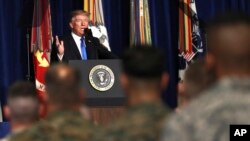President Donald Trump says that the United States must continue fighting in Afghanistan in a conflict that he once called a “complete waste.”
In a televised speech to the nation, Trump said his “original instinct was to pull out.” But he said he changed his mind after a series of meetings with his Cabinet members and top military advisors.
Trump said a “hasty withdrawal would create a vacuum that terrorists – including ISIS and Al Qaeda – would instantly fill.” He added the U.S. must prevent Afghanistan and the region from giving shelter to Islamist militants.
“We can no longer be silent about Pakistan’s safe havens for terrorist organizations, the Taliban, and other groups that pose a threat to the region and beyond,” he said.
Trump said, going forward, U.S. military involvement in Afghanistan will be based on conditions on the ground. He said no time period would be set for withdrawal. And, he said the U.S. would not announce future military plans, including troop numbers.
“America's enemies must never know our plans or believe they can wait us out. I will not say when we are going to attack, but attack we will.”
For years, Trump has criticized the U.S. effort in Afghanistan and called for a "speedy withdrawal" of U.S. troops.
As president, Trump has questioned whether sending more troops is wise. "We're not winning," he told advisers in a July meeting.
But Defense Secretary Jim Mattis has argued that a U.S. military presence is needed to protect against a continuing threat from Islamist militants.
On Sunday, Mattis said the president’s plan involved more than just Afghanistan, saying it amounted to a full "South Asia strategy."
And, earlier Monday, Secretary of State Rex Tillerson spoke on the phone with leaders of Pakistan, India, and Afghanistan to discuss the new U.S. “regional strategy.”
U.S. generals have advised Trump to send as many as 4,000 troops to retake territory from the Taliban. The group now controls nearly half of Afghanistan. But Trump, who campaigned on an "America First" foreign policy, has been resistant to commit more troops to the country.
James Dobbins was a U.S. special diplomat to Afghanistan and Pakistan under former President Barack Obama. Before Trump spoke Monday night, Dobbins said the president has only a choice between "losing and not losing."
"Winning is not an option," Dobbins told VOA's Afghan Service.
More U.S. troops could help train more members of the Afghan special forces, says Michael Kugelman, a South Asian expert at the Wilson Center. The new strategy, Kugelman added, has to consider Pakistan’s role in the region.
Pakistan, he said, “happens to play a key role in the war in Afghanistan because, among other things, leaders of the Taliban insurgency have used Pakistan as a sanctuary.”
Currently, there are about 8,400 U.S. troops in Afghanistan. Most are advising Afghan forces but some are involved in operations against the Taliban and the Islamic State’s Afghan affiliate.
That number is down from nearly 100,000 troops in August 2010. The war in Afghanistan started in October 2001 under President George W. Bush after the September 11 terrorist attacks on New York and Washington.
"Most Afghans are not expecting any fundamental change in U.S. policy," said Aimal Faizi, an Afghan journalist and aide to former President Hamid Karzai.
"Afghanistan has become a global issue. Any U.S. strategy based on the assumption that Washington alone decides the way forward in Afghanistan is a terrible mistake," he said.
Hai Do wrote this story for Learning English based on VOA News, the Associated Press and Reuters news reports. Caty Weaver was the editor.
_____________________________________________________________
Words in This Story
original - adj. happening or existing first or at the beginning
instinct - n. a natural desire or tendency that makes you want to act in a particular way
vaccum - n. a situation created when an important person or thing has gone and has not been replaced
haven - n. a place where you are protected from danger, trouble, etc.
pose - v. to be or create (a possible threat, danger, problem, etc.)
strategy - n. a careful plan or method for achieving a particular goal usually over a long period of time
commit - v. to decide to use (a person, money, etc.) for some particular purpose or use — often + to or for
option - n. the opportunity or ability to choose something or to choose between two or more things
insurgency - n. a usually violent attempt to take control of a government : a rebellion or uprising
sanctuary - n. a place where someone or something is protected or given shelter





